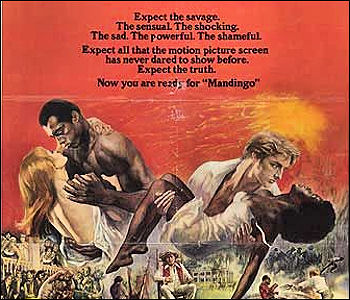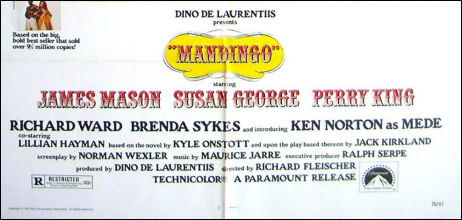I saw Richard Fleischer‘s Mandingo with a couple of friends at one of the New York repertory cinemas (probably the Carnegie Hall or the Bleecker) in the late ’70s. Unavailable on DVD in this country, it’s a piece of rank steamy pulp about a slave (Ken Norton), slave-owners (James Mason, Perry King) and inter-racial shtupping (Susan George being a significant participant).

Mandingo had originally opened in ’75, but by the time I saw it the cool-cat revisionist attitude had settled in. It wasn’t a hoot as much as a howl — one of the most appalling sexual soap-operas ever made, but also a knowing wallow. It was a cinefile’s version of mud wrestling or Tijuana donkey sex made extra-laughable by cheap social criticism. The stamp of “produced by Dino de Laurentiis” made it all the more delicious.
I don’t remember laughing or even smirking. (Although one of my friends did.) I don’t remember it being a turn-on, even. I’ve repressed most of the experience (the mind flushes this stuff out as a kind of survival mechanism), but I do remember the repulsion. I’ve seen my share of exploitation films, but my lingering impression was of a film that truly stunk from the head and the groin.
I was young at the time, however, and I didn’t have the perspective to appreciate Mandingo‘s undercurrents. To hear it from N.Y. Times resident film-dweeb Dave Kehr, Mandingo, to be screened this coming Saturday as part of a mini-Fleischer retrospective at the annual Film Comment Selects series at Lincoln Center, is Fleischer’s “last great crime film” as well as “a thinly veiled Holocaust [parable].”
Kehr’s auteurist-revisionist view is a classic case of “believing is seeing.” Ignore the experience of the film and whatever primal reactions you may have had to it. Consider instead the director’s thematic tradition, and focus on the high-minded intent that hangs suspended above the swamp.

“When Mandingo was released, many critics erupted with rage over its aggressively tasteless portrayal of the slave-owning South,” Kehr begins, “which seems in retrospect both a desired and appropriate response. More than a portrait of social decadence, Mandingo is Fleischer’s last great crime film, in which the role of the faceless killer is played by an entire social system.
“For the French critic Jacques Lourcelles, one of Fleischer’s most articulate admirers, the recurring theme of his work is society slipping into decadence. Fleischer’s most provocative film on this theme is the still potent Mandingo from 1975 (Feb. 23, Walter Reade Theater), an anti-Gone with the Wind that treats the pre-Civil War South as a swamp of degradation for white masters and black slaves alike.
“Rattling around a tumble-down Tara of peeling plaster and near-empty rooms, James Mason (Captain Nemo in Fleischer’s children’s classic 20,000 Leagues Under the Sea) presides over a human breeding farm. He is as occupied with finding a suitable stud for his prize female slave as with finding a bride who will give his lame son (Perry King) the male heir he requires.
“The treatment of humans as so much chattel, to be bought, sold and cruelly abused regardless of their social position, makes Mandingo a thinly veiled Holocaust film that spares none of its protagonists. More than a portrait of social decadence, Mandingo is Fleischer’s last great crime film, in which the role of the faceless killer is played by an entire social system.”
DVD Availabilty Update: Pete Hammond reports he bought a DVD of Mandingo and Drum at Ameoba two years ago. The DVD distributor is Blaxfilm, he says.
Hammond says that copies are available on E-Bay.
